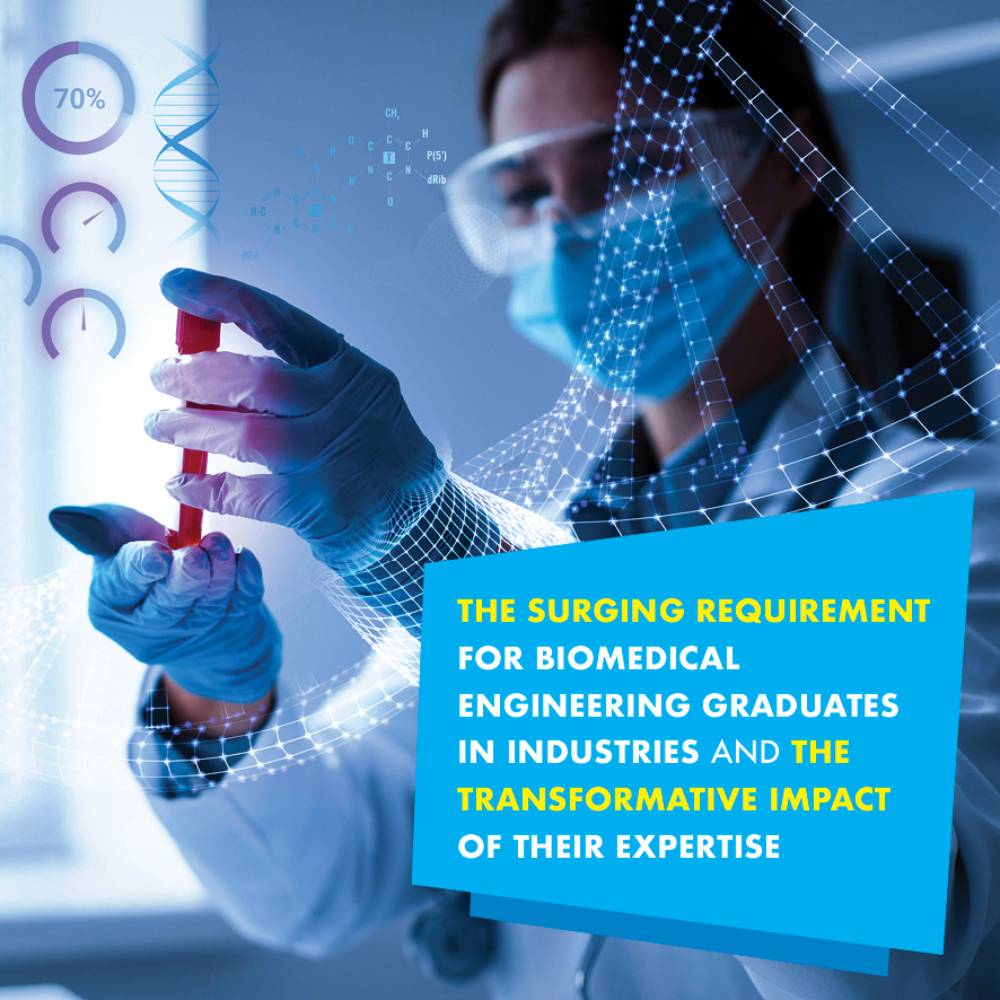
The Surging Requirement for Biomedical Engineering Graduates in Industries and the Transformative Impact of Their Expertise
In the ever-evolving landscape of healthcare and technology, the demand for skilled professionals who can bridge the gap between biology and engineering has never been higher. Biomedical engineering, a multidisciplinary field that combines principles from both biological and technical domains, is at the forefront of this transformation. Industries worldwide are increasingly recognizing the unique skill set possessed by biomedical engineering graduates and are actively seeking their expertise to revolutionize various sectors.
Meeting the Industry Demand
Biomedical engineering graduates are equipped with a diverse skill set, ranging from biology and chemistry to mechanical and electrical engineering. This interdisciplinary knowledge enables them to innovate and create solutions that address complex challenges in the medical field. As industries expand their focus on healthcare technologies, medical devices, and biopharmaceuticals, the need for professionals who understand the intricacies of both biology and engineering becomes paramount.
Revolutionizing Healthcare
One of the most significant impacts of biomedical engineering graduates is witnessed in the healthcare sector. Their expertise is instrumental in designing cutting-edge medical devices, diagnostic tools, and healthcare software. From advanced prosthetics and wearable health monitoring devices to sophisticated imaging technologies, biomedical engineers are driving the development of revolutionary healthcare solutions that enhance patient care and improve treatment outcomes.
Shaping Biotechnology and Pharmaceuticals
In the biotechnology and pharmaceutical industries, biomedical engineering graduates play a pivotal role in research, development, and manufacturing processes. Their understanding of biological systems combined with engineering principles is vital for creating innovative drugs, vaccines, and therapies. Biomedical engineers contribute to optimizing bioprocessing techniques, ensuring the production of high-quality pharmaceuticals, and accelerating the pace of medical discoveries.
Advancing Research and Academia
Beyond the industrial sector, biomedical engineering graduates are actively engaged in cutting-edge research and academia. Their contributions to scientific research, both in universities and research institutions, lead to groundbreaking discoveries. Through their work, they pave the way for new advancements, methodologies, and technologies, ultimately shaping the future of healthcare and engineering disciplines.
The surging requirement for biomedical engineering graduates in industries signifies the recognition of their invaluable expertise. As industries continue to evolve and integrate technological innovations into healthcare and related fields, the transformative impact of biomedical engineering professionals will remain unparalleled. By addressing the complex challenges of the modern world, these graduates are not just meeting industry demands; they are revolutionizing the way we approach healthcare, biotechnology, and pharmaceuticals, shaping a healthier and technologically advanced future for us all. (Vid/DM)
Are you passionate about Biomedical Engineering?
If you are eager to enhance your understanding of Biomedical Engineering, this knowledge can pave the way for a fulfilling career as an engineer. Embark on your educational journey at Swiss German University (SGU).
At SGU, students studying Biomedical Engineering will receive comprehensive training and preparation. Upon completion of the program, students have the opportunity to obtain professional certifications tailored to their interests and career goals. These certifications not only broaden their expertise but also facilitate a seamless transition into the job market. Graduates holding a bachelor’s degree in biomedical engineering from SGU are well-equipped to explore diverse and global employment opportunities. In the realm of technopreneurship, innovation plays a pivotal role in achieving success, and our program is designed to nurture innovative thinking.
Discover our detailed curriculum by clicking the button below. If you are keen on learning more about Biomedical Engineering at SGU, don’t hesitate to reach out to our consultants. Your journey to a rewarding career in Biomedical Engineering starts here.
About SGU
SWISS GERMAN UNIVERSITY (SGU) is an international university in Indonesia, was established in 2000 as a joint effort between Indonesia, Germany, Switzerland, and Austria. We are the pioneer in offering international curricula in Indonesia. Qualified students can graduate with a Double Degree from Indonesia and Germany, which SGU provides in cooperation with partner universities; surely a valuable tool for your future careers. Ever since its establishment, SGU has been dedicated to delivering quality education in line with international standards and aims to develop skilled professionals who meet the demands of the industry. In order to achieve its objectives, SGU offers quality-oriented learning through 14 Bachelor’s Degree Programs and 6 Master’s Degree Programs ranging from Engineering, Information Technology, and Business to Life Sciences and Social Sciences. Furthermore, with small class sizes, and with English as the medium of instruction, you can look forward to pursuing your tertiary education and degree with full confidence.

